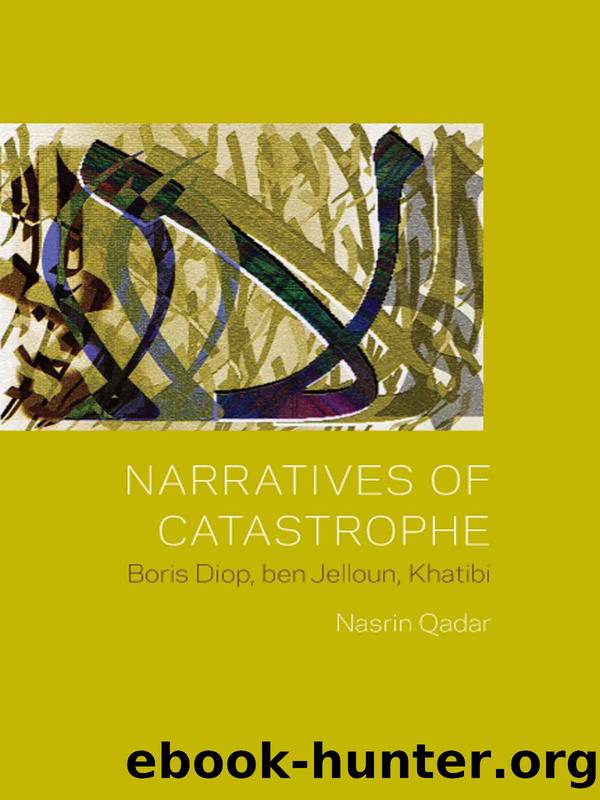Narratives of Catastrophe by Qader Nasrin;

Author:Qader, Nasrin;
Language: eng
Format: epub
Publisher: Fordham University Press
Published: 2009-08-15T00:00:00+00:00
4. Un-limiting Thought
Abdelkebir Khatibiâs thought haunts this project from its first pages. Therefore, it is only fitting that the last chapters be dedicated to direct and sustained engagement with Abdelkebir Khatibi, as a writer and as a thinker. This double engagement is made necessary by Khatibiâs oeuvre, which seldom distinguishes, in clear lines, the literary from the nonliterary. He calls his own literary work âune écriture pensanteâ (a thinking writing), thus highlighting the conjunction between writing and thinking. I have adopted this framework of âécriture pensanteâ in my approach to all the texts so far. Yet the question of thinking remains to be explored and thought. This chapter is dedicated to such an exploration.
Khatibi is Moroccoâs most renowned contemporary thinker and writer. His work, which has been translated into numerous languages, has received critical attention from philosophers and literary critics in his own country and on the international scene, especially in France and among scholars of Francophone literature in the United States. Therefore, his intellectual concerns regarding writing and language, his constant questioning of metaphysics, and his critical engagement with the Islamic traditions are well known, though less so in the English-speaking world due to a lack of translation. Much of the criticism on Khatibi has taken as its central concern the issues of translation, bilingualism, and writing. However, the question of thinking, recurrent in Khatibiâs oeuvre, and the relationship between thinking and literature in his work, have received cursory attention at best.
In this chapter, I will turn my attention to the movements of thought in his best-known text, Amour bilingue (Love in Two Languages). I will show how the vicissitudes of thought are marked by the relation between thought and catastrophe, that is, the irruption of an event, the disruption and intensity of which thought cannot register in the narration, except obliquely. This relation between the movements of thought and those of language provide the momentum for Amour bilingue. In this reading, the primary figure of the story, la Bi-langue, becomes the fading and dispersive center of a narration, struggling to sustain the unsustainable and engendering the story of an impossible love and of a failing encounter.
However, I will first take a detour from Amour bilingue in order to elucidate the problematic of thought for Khatibi as put forth in his 1981 essay âPensée-autreâ (âThought-Otherâ). This detour is necessitated by direct modes of mutual address between the two texts as well as by the fact that any displacement of thought from the conceptual, or philosophical, register to the literary requires engagement with both these modes of presentation, for it is not given that the confines of these modes of speech are distinguishable. Therefore, when we argue that pensée-autre moves the question of thought from the philosophical to the literary, the terms of the distinction between the two domains must be clarified.
In âPensée-autre,â Abdelkebir Khatibi outlines a way of thinking that challenges and destabilizes the metaphysical tradition that has oriented Maghrebiansâ and Westernersâ thinking about the Maghreb. This metaphysical tradition
Download
This site does not store any files on its server. We only index and link to content provided by other sites. Please contact the content providers to delete copyright contents if any and email us, we'll remove relevant links or contents immediately.
The European History Highway: A Guide to Internet Resources by Dennis A. Trinkle Scott A. Merriman(494)
The Seven Wonders of the Ancient World by Michael Denis Higgins(476)
European Security in a Global Context by Thierry Tardy(470)
European Security without the Soviet Union by Stuart Croft Phil Williams(469)
The Routledge companion to Christian ethics by D. Stephen Long Rebekah L. Miles(457)
Hudud Al-'Alam 'The Regions of the World' - a Persian Geography 372 A.H. (982 AD) by V. V. Minorsky & C. E. Bosworth(399)
Gorbachev And His Generals by William C. Green(391)
Get Real with Storytime by Julie Dietzel-Glair & Marianne Crandall Follis(390)
Tibetan Studies in Comparative Perspective by Chih-yu Shih Yu-Wen Chen(385)
Governance, Growth and Global Leadership by Espen Moe(381)
Hyperculture by Byung-Chul Han(377)
CliffsNotes on Fitzgerald's The Great Gatsby by Kate Maurer(360)
The Oxford History of the World by Fernández-Armesto Felipe;(353)
How Languages Are Learned 5th Edition by Patsy M Lightbown;Nina Spada; & Nina Spada(352)
The Egyptian Economy, 1952-2000 by Khalid Ikram(351)
Oral Poetry and Narratives from Central Arabia: The Poetry of Ad-Dindan : A Bedouin Bard in Southern Najd (Studies in Arabic Literature, Vol 17) (English and Arabic Edition) by P. M. Kupershoek P. Marcel Kurpershoek(343)
The Oxford Handbook of the Incas by Sonia Alconini(333)
Europe Contested by Harold James(319)
The Hutchinson Dictionary of Ancient and Medieval Warfare by Peter Connolly John Gillingham John Lazenby(305)
